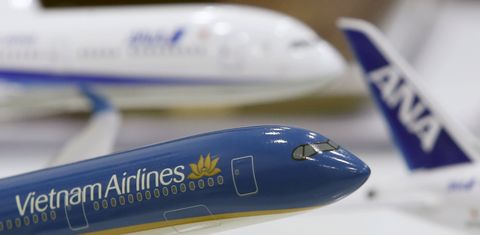Membres • Actualités
Vietnam Airlines plans new listing as Hanoi reduces stake

HO CHI MINH CITY -- State-owned Vietnam Airlines is set to list 1.4 billion shares on the Ho Chi Minh stock exchange as early as May, marking the next step for the government in its plans to reduce ownership in the airline to 51% by 2020.
The new listing will come five years after the airline's initial public offering in November 2014 which saw its shares become available on the Unlisted Public Company Market from 2017. Its shares were trading at around 41,000 dong ($1.77) on Tuesday. Vietnam Airlines is expected to announce details of the listing this week.
In 2016, Japan's All Nippon Airways spent some $108 million to acquire an 8.8% stake in the Vietnamese carrier, becoming a foreign strategic investor. Vietnam caps foreign ownership of airlines at 30%, although Vietnam's transport ministry last year proposed lifting the limit to 49%. The government currently owns 86.1% of the carrier.
Vietnam Airlines aims to leverage the growth potential of the country's aviation market, which is expanding at the fifth-fastest rate in the world. The number of airline passengers in the country is expected to reach 150 million by 2035, according to estimates by the International Air Transport Association.
In 2018, Vietnam Airlines posted revenue of 96.8 trillion dong ($4.17 billion), a year-on-year increase of 17%. Its pretax profit increased 5% to 3.3 trillion dong. The carrier aims to achieve consolidated revenue of 112 trillion dong ($4.83 billion) in 2019, a year-on-year increase of 13%.
However, the airline is expected to face challenges in the next two years, Bao Doan, an analyst at SSI said. Fierce competition with low-cost carriers, including Vietjet Aviation and Bamboo Airways, has resulted in a dramatic loss of market share.
As of December 2018, Vietnam Airlines' domestic market share stood at 37%, down from 80% in 2011 when Vietjet, the country's first budget carrier, began operations. Vietjet's market share quickly surpassed the national flag carrier to reach 48% in 2018.
Bamboo Airways, another privately-owned carrier which entered the market earlier this year, poses a new threat to Vietnam Airlines. Its parent group FLC has gained the approval of shareholders to inject some 700 billion dong, increasing its capital to 2,000 trillion dong, to fund its expansion strategy. Bamboo recently announced the launch of routes to Singapore, Japan and South Korea in the coming months.
Other airline joint ventures in Vietnam are awaiting flying licenses from the country's authorities, including AirAsia and Thien Minh Group, and Vietstar Airlines. Vietravel, Vietnam's biggest tourist agent, also said it was working to establish a carrier soon to meet growing demand from air travelers.
Vietnam Airlines is believed to be focusing on an overseas expansion, with potential plans to buy new long-range Boeing aircraft to enhance its international network, including a direct route from Ho Chi Minh City to Los Angeles or San Francisco in 2020. This would come after the U.S. Federal Aviation Administration granted a Category 1 rating to Vietnam in February, allowing its airlines to operate direct links to the U.S. However, a source from Vietnam Airlines told the Nikkei Asian Review that the airline would make a careful study of passenger demand before launching direct commercial routes between the two countries.
This year, Vietnam Airlines is set to take delivery of 22 aircraft, including two Airbus A350s and 20 Airbus A321neo jets, increasing its fleet size to 112.
Source : Nikkei


